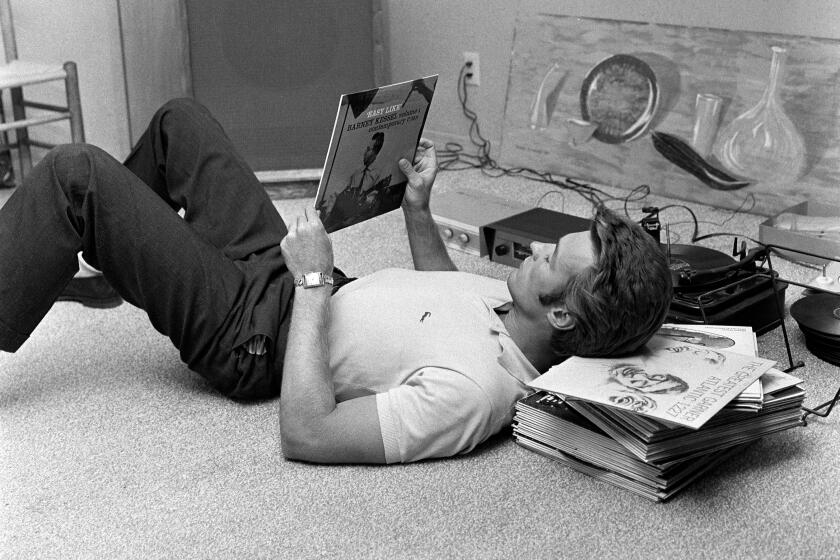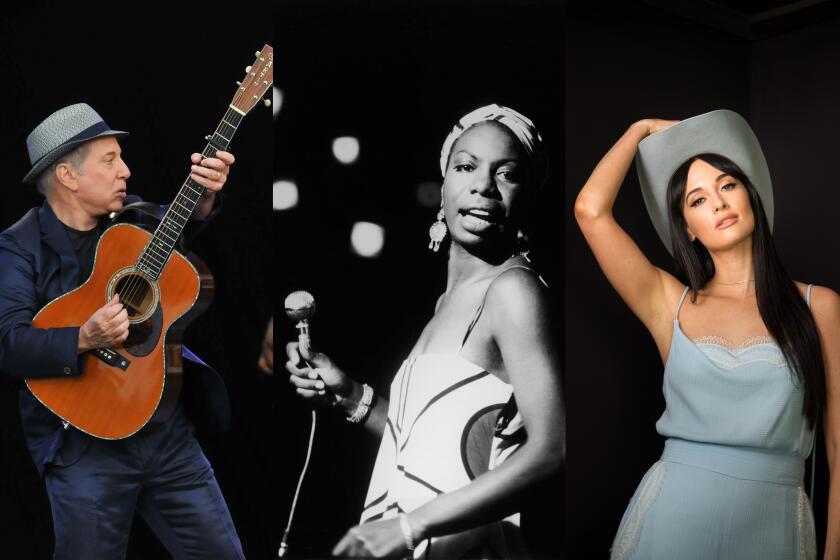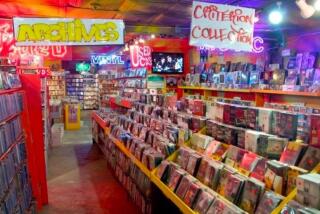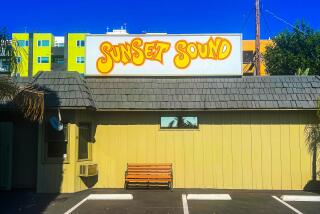Three new documentaries explore the enduring allure of a great record store
In the Before Times, the annual vinyl celebration Record Store Day would have occurred this weekend. Considered high holy day for a certain sect of the music-loving realm, the event generates hundreds of limited-release records for sale in the small but vibrant music retail marketplace.
The most profitable day of the year, it has kept the turntables powered in hundreds of mom-and-pop shops. But with retail shuttered due to the COVID-19 restrictions, organizers of the event pushed Record Store Day to June (though that date will likely change).
Those looking to indulge their vinyl fetish, though, can do it with a triple feature of new feature-length documentaries available this weekend. The three movies offer a kaleidoscopic view of the ways in which physical music, and the communal spaces that buy and sell it, has become a kind of secular religion.
Though the directors never could have predicted it, they’re also bittersweet odes to shops that are going silent before our very ears.
How to keep Coronavirus stress at bay: Listen, really listen, to your favorite albums, front to back, without distraction.
“Record Safari” is an on-the-road story guided by Pomona-based collector and used record retailer Alex Rodriguez as he embarks on a monthlong trans-American buying spree. “Vinyl Nation” takes a more macro look at the unlikely return of vinyl as a music format, documents the nuts and bolts of record making, and retells the behind-the-scenes rise of Record Store Day. And “Other Music” is a love song to one particular shop, the beloved Manhattan record store Other Music. Before closing in 2016, it had the most influence per square foot of any music retailer in the world.
“People who listen to records deserve to have a job where they can do that,” says Stuart Braithwaite, guitarist of Scottish band Mogwai, in “Other Music.” That belief drives all three of these movies, but each conveys it from a different point of view.
Directed by Vincent Vittorio, “Record Safari” is told from the perspective not of a shop or of a movement, but of Rodriguez. The general manager of Glasshouse Records in downtown Pomona, owned by Coachella founder Paul Tollett, Rodriguez stocks and operates both the shop and Coachella’s long-running on-site vinyl tent. Rodriguez would have been selling records in Indio this weekend, in fact.
The self-described “hippie longhair weirdo” has an enviable job: A few times a year he rents a car on somebody else’s dime, heads out to the highway and fills up the trunk with records culled from shops in midsize towns. On the trip shown in the film, director Vittorio sits on the passenger side and follows Rodriguez on stops from Southern California to the Northeast and back.
A meditative film about the joy of discovery and the ways in which obscure frequencies can upend psyches, the film is informed by Rodriguez’s understated, guru-like presence. Early on, he’s shown standing on a Pacific Northwest beach in bell-bottoms and a tattered Judas Priest T-shirt, pondering the ocean’s depths before heading east in search of another sort of depth.
Along the way, he and Vittorio introduce us to shop owners and collectors in Missoula, Bismark, Fargo, Minneapolis, Detroit, New York, New Orleans, Austin and elsewhere. As Rodriguez flips through, literally, every album in every crate in every store, owners and collectors chat about their stock and their lives.
“We’re being filmed having a nerd conversation,” says Thomas Jones, co-owner of Crossroads Records in Portland, Ore. during one in-store interview. He’s got a point. Collectors, whether of first-edition books, Star Trek trivia or first-pressing garage rock 45s, are an insular bunch, and a whole subset of film has been devoted to such communities.
That insularity hides some great personalities. Rodriguez chats with New York DJ and producer Pete Rock, Patti Smith guitarist and “Nuggets” compiler Lenny Kaye and hip-hop scholar and writer Oliver Wang, among others. The hunter dives through basement overstock and crawls through attic cubbies for hidden finds. The goal is a noble one: He wants to dig up records and help them on their way to what he calls “their forever homes.”
We polled more than 30 music critics, inside and outside The Times, on the best albums to listen to while you’re stuck at home (and kind of freaking out).
“There’s a diamond bumping in between this canyon,” says producer John Vanderslice in “Vinyl Nation” on the mechanics of record playing. Produced and directed by Kevin Smokler and Christopher Boone, it focuses on the revival of record manufacturing and the sheer magic of capturing sound waves and locking them onto a plastic disc.
Smokler and Boone crisscross America in search of vinyl-guided mystics. They visit record pressing plants, jacket manufacturers and record stores. In Ventura, they interview Logan Melissa, whose popular Instagram account features her visually recreating classic album covers from her record stacks.
In Kansas City, the camera moves down a blocklong line of Record Store Day customers waiting for Mills Record Co. to open for the day, then follows them in as they shop. Speaking among his voluminous collection, writer and DJ Wang (who also appears in “Record Safari”) recalls the ways in which samples on hip-hop tracks generated an entire subset of obsessives.
Down I-5, the film travels to Stoughton Printing in City of Industry. There, long-bearded production planner Rob Maushund recalls the ways in which the stalwart jacket-pressing company has endured the ups and downs of the business. In doing so, he illustrates how a record’s physicality — its texture, weight, composition — inspires such fetishism.
“If there are one or more people with Jheri curls on the cover, I’m pretty sure there’s going to be some heat,” says Los Angeles collector Monalisa Murray of one picking strategy.
It’s safe to say most music freaks interviewed in both “Record Safari” and “Vinyl Nation” would cite Other Music as among the most important indie retailers of the past few decades. When it opened in 1995, it did so across the street from the then-powerhouse Tower Records superstore. About the size of a two-car garage, Other Music felt packed when more than a dozen people were shopping.
The reason for its importance is best explained by Depeche Mode’s Martin Gore during “Other Music”: “Per square meter, it probably had more interest value than any other shop I’d ever been in in the world.”

Opened by a trio of Kim’s Underground expats — Josh Madell, Chris Vanderloo and Jeff Gibson — Other Music helped define the notion of a “curated” record store as Napster and iTunes were decimating the market for physical music. Across the street, Tower had everything, no matter if it was good, bad or neither. Because of its size, Other Music couldn’t fit much, so every recording it carried had to be great.
“Other Music is kind of like a religious experience,” actor Benicio del Toro says during the film, as he’s picking up a box of new stuff. “After a while they get to know your taste, and sometimes I just come here and say, ‘Pick ‘em.’”
Elsewhere directors Puloma Basu and Rob Hatch-Miller sit down with famous people including actor Jason Schwartzman and TV on the Radio singer Tunde Adebimpe to discuss the ways in which the space informed East Village culture. The directors were allowed access as the shop made the difficult decision to close, and the film gets into the close-quartered lives of a group of fanatics whose lives were changed in a shoebox shop.
The film, in fact, begins at the end of Other Music’s story, as a second-line-style parade marches through the neighborhood to mark the company’s demise. Across the next 90 minutes, Basu and Hatch-Miller illuminate ways in which little rooms with good music can build scenes as they inform and enliven entire populations. Vampire Weekend’s Ezra Koenig recalls discovering “the curated, cool place across from this massive megastore” as a kid. Le Tigre’s JD Samson speaks of similar epiphanies.
“Other Music” reaches its climax when the store announces its closure, and cameras are inside as longtime customers go on final sprees and bid farewells. “They should have a therapist here,” says one customer as the final day approaches.
Sadly, viewers might want to have their therapists on speed dial during the triple feature. As with every other small business during the shutdown, record stores are barely surviving. Some are making do through Instagram sales or eBay auctions. Proceeds from online sales of “Vinyl Nation” and “Other Music,” in fact, are being directed to brick-and-mortar music retailers for a limited time. .
Only as social distancing restrictions ease will buyers and sellers know how many stores remain.
Still, the devotion for record shops conveyed across the three films suggests that as long as the stock hasn’t warped or molded, buyers will be waiting outside on the first morning of After Times, if they aren’t already.
++
“Record Safari” is currently available for viewing through Record Safari site, Apple TV, Roku, Vimeo and Chromecast.
“Vinyl Nation” will offer a limited-time digital screening, in partnership with Record Store Day, on Saturday and Sunday. Ticket sales will benefit independent record retailers. More info.
“Other Music” is available for $11.50 through Thursday for screening via Factory 25. Ticket sales will benefit independent record retailers.
More to Read
The biggest entertainment stories
Get our big stories about Hollywood, film, television, music, arts, culture and more right in your inbox as soon as they publish.
You may occasionally receive promotional content from the Los Angeles Times.









